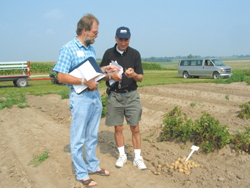
Features
Production
Research
New research proposes to expand potato markets
proposes to expand potato markets
April 15, 2008 By Karen Dallimore
Boiled or mashed? Would you like
fries with that? These lines are familiar when you’re talking potatoes,
but what about potatoes as a new functional food that can help you lose
weight?
 |
| Dr Rickey Yada (left), Department of Food Science, and Elliott Currie (right), Department of Agricultural Economics and Business at the University of Guelph. Photo by Karen Dallimore. |
Boiled or mashed? Would you like fries with that? These lines are familiar when you’re talking potatoes, but what about potatoes as a new functional food that can help you lose weight? Or, better yet, is there a product made from potatoes that we haven’t even invented yet?
A couple of researchers were asking such questions at the 8th Annual Potato Field Day held at the Elora Research Station in Elora, Ontario in August. They were looking to drum up support for their proposals that included a study into the role of the potato as a “functional food,” and the creation of new market opportunities for potato products fresh from the eager minds of students.
Dr. France Cho, Nutritional Scientist at the University of Toronto, sees a role for the good ol’ potato in the regulation of food intake. Obesity is escalating, he says, and diets and medications are not working. His theory is that eating potatoes may help to naturally regulate food intake: if you eat potatoes, you will want less food at your next meal.
In addition, his preliminary work has indicated that blood glucose levels respond differently to different processing and cooking methods. For example, French fries don’t spike blood sugar like mashed potatoes do, and even serving temperature affects starch uptake: colder foods result in less carbohydrates going in to the body.
He thinks he might have found a way to show this scientifically and what he is looking for is the chance to test his theories.
Cho proposes to study the intake of different varieties and preparations of potatoes to compare the resulting blood insulin, food intake and blood sugar levels, and hopes to make recommendations for the varieties and possibly different processing methods that are best suited to making the potato a functional food for weight control.
In this way, he hopes to focus on the potato as a positive addition to the diet and that can only mean good news for the potato industry.
For Elliott Currie of the Department of Agricultural Economics and Business at the University of Guelph, Potato Field Day was a chance to promote his proposal that could see the usual potato end up in some unusual places.
“Students don’t know what can’t be done,” says Currie, who pointed out that the biggest resource at the university is its bright young minds. He proposes to recruit between 10 and 15 students over two terms to get creative with potatoes, with ideas that could be as simple as popularizing perogies. Currie often views the potato industry as “mature,” but he suggested that maybe it is only lacking input from the next generation and from different ethnic groups.
The course concept has already experienced a trial run, where over the past year Currie has been able to unleash some product ingenuity on the dairy industry. Students got a chance to use their creativity to earn class credits while developing business proposals that would direct their ideas into the practical reality of the marketplace. Last year, 13 students generated nearly 70 product ideas for dairy that were eventually narrowed down to between 18 or 19 products. This year Currie wants to target potatoes.
Students will be drawn from a pool of business and agricultural backgrounds, which broadens the resource base beyond the typical realm and increases the likelihood that product ideas will not necessarily be just food. The only rules of the game are that the idea has to be profitable and technically feasible. “There’s no point in doing it unless there’s a profit,” says Currie.
Both researchers are hoping to obtain the financial backing of members of the potato industry to further develop their projects.
Print this page